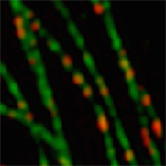
|
|||
|
|
||
Postdoc, Student and Undergrad positions are available
|
|||
 |
RapidCaP
We have developed the RapidCaP model system for metastatic prostate cancer, which uses surgery for gene manipulation, instead of breeding. This approach offers tremendous flexibility, has drammatically reduced model generation times and allows us to visualize metastatic prostate cancer through live bioluminescence imaging. We use the system to understand the molecular and genetic evolution of metastasis and therapy resistance and now pursue three major avenues: - Single cell analysis of metastatic genome evolution - Novel therapy and biomarkers for translation to human - Novel technology for metastasis gene discovery
Recent progress A new approach to target MYC and metastasis - J Cell Biology Metastasis to lung accelerated by smoking - Science Metformin, mitochondria and prostate cancer - Cell Reports Paracrine MYC activation in metastatic PC - Cancer Discovery Myc drives PTEN mutant prostate metastasis - Cancer Discovery
|
||
 |
PTEN Regulation
The PTEN/ PI 3-Kinase enzyme system translates extracellular growth cues into intracellular signals. To achieve this, PTEN turns cell membrane phospholipids into an off-state. This prevents membrane recruitment and activation of growth promoting kinases. Receptor tyrosine kinases revert PTEN function by activating PI 3 Kinase, leading to membrane recruitment and activation of the oncogenic AKT kinase (see snapshots, left). In spite of its plasma-membrane function, PTEN has been consistently observed in cell nuclei, but mechanism and relevance of this localization have remained unclear. We have originally resolved this paradox by demonstrating that mono-ubiquitination of PTEN is essential for nuclear import, while poly-ubiquitination results in PTEN degradation. Patients harboring a germ line mutation in a PTEN ubiquitination site suffer from inheritable Cowden’s Disease. They develop pre-cancerous lesions, which display nuclear exclusion of PTEN. Since the cytoplasmic mutant retains catalytic activity, we can conclude that PTEN nuclear import is essential for tumor suppression. These findings demonstrate how a comprehensive view of disease initiation can be attained from integration of biochemistry, cell biology and human genetics and give rise to new ideas for combatting cancer.
Recent progress PTEN nuclear transport and lung cancer - J Cell Biology PTEN funcions on endocytic vesicles - Molecular Cell p53 mutation dictates PIP lipid tail chain lengths - Cell Reports PTEN suppression as a natural process - Trends Cell Biology
|
||
 |
|||